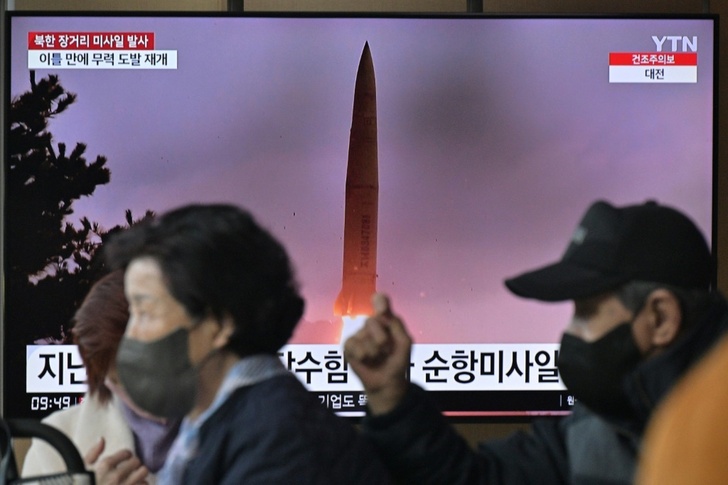North Korea fired a "long-range ballistic missile" Thursday, Seoul said, as South Korean President Yoon Suk Yeol headed to Tokyo for a summit to boost ties in the face of Pyongyang's growing aggression.
The launch was North Korea's third show of force since Sunday and came as South Korea and the United States staged their largest joint military drills in five years.
"Our military detected one long-range ballistic missile fired from around the Sunan area in Pyongyang," South Korea's Joint Chiefs of Staff said, telling AFP it was an ICBM-class missile.
The missile was fired on a lofted trajectory -- up instead of out, typically done to avoid overflying neighbouring countries -- and flew some 1,000 kilometres (620 miles), the JCS added.
At a National Security Council meeting, Yoon called for strengthened trilateral cooperation with Japan and the United States, adding that "North Korea will pay a clear price for such reckless provocations", his office said in a statement.
Japan's cabinet office said the missile reached a maximum altitude of more than 6,000 km.
Prime Minister Fumio Kishida told reporters he would meet ministers from the National Security Council.
"Peace and stability in the region is a very important issue," Kishida added.
The Thursday launch came hours before the leaders of South Korea and Japan were due to meet in Tokyo, with Pyongyang's missile and nuclear programmes high on the agenda.
That summit -- the first in 12 years -- comes as the two neighbours seek to mend diplomatic ties long strained by Japanese atrocities during its 35-year colonial rule.
Both South Korea and Japan are ramping up defence spending and joint military exercises, which Yoon has said are essential for regional and global stability.
"There is an increasing need for Korea and Japan to cooperate in this time of a polycrisis with North Korean nuclear and missile threats escalating," Yoon said in a written interview with media including AFP ahead of his trip.
- 'Looking for excuses' -
Analysts said North Korea timed the launch on the day of the summit for "double effect" as a warning to its neighbours while protesting the US-South Korea joint drills.
Leader Kim Jong Un earlier this month ordered the North Korean military to intensify drills to prepare for a "real war".
"For a North Korea that's constantly looking for excuses to justify its hostile activities and weapons development, it's prime time for Kim to roll out his missiles," said Soo Kim, a former CIA Korea analyst who now works at management consulting firm LMI.
Leif Easley, a professor at Ewha University in Seoul, said that the test was an attempt by Kim "to threaten Tokyo for deepening trilateral cooperation with Washington and Seoul and to coerce South Korea from holding further defence exercises with the United States."
Seoul and Washington have ramped up defence cooperation in the face of growing military and nuclear threats from the North, which has conducted a series of increasingly provocative banned weapons tests in recent months.
On Tuesday, North Korea fired two short-range ballistic missiles, having launched two strategic cruise missiles from a submarine Sunday, just hours before the US-South Korea exercises kicked off.
Known as Freedom Shield, the drills started Monday and are set to run for 10 days.
The Freedom Shield exercises focus on the "changing security environment" due to North Korea's redoubled aggression, the allies have said.
North Korea views all such drills as rehearsals for invasion and has repeatedly warned it would take "overwhelming" action in response.
The Thursday test "may be a rehearsal for a normal angle ICBM launch or it could be a check-up in the North's preparations for a reconnaissance satellite launch," Yang Moo-jin, a professor at the University of North Korean Studies in Seoul, told AFP.
North Korea has never fired its most powerful missiles at a normal trajectory, and analysts question whether they have the technology to survive re-entry into the atmosphere.
Pyongyang, which last year declared itself an "irreversible" nuclear power, has said previously that launching a military reconnaissance satellite is one of its priorities.
sh/ceb/qan
© Agence France-Presse
Your content is great. However, if any of the content contained herein violates any rights of yours, including those of copyright, please contact us immediately by e-mail at media[@]kissrpr.com.
Source: Story.KISSPR.com

